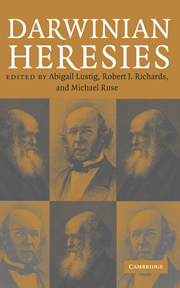Book contents
- Frontmatter
- Contents
- List of Contributors
- 1 Introduction: Biologists on Crusade
- 2 Russian Theoretical Biology between Heresy and Orthodoxy: Georgii Shaposhnikov and His Experiments on Plant Lice
- 3 The Specter of Darwinism: The Popular Image of Darwinism in Early Twentieth-Century Britain
- 4 Natural Atheology
- 5 Ironic Heresy: How Young-Earth Creationists Came to Embrace Rapid Microevolution by Means of Natural Selection
- 6 If This Be Heresy: Haeckel's Conversion to Darwinism
- 7 Adaptive Landscapes and Dynamic Equilibrium: The Spencerian Contribution to Twentieth-Century American Evolutionary Biology
- 8 “The Ninth Mortal Sin”: The Lamarckism of W. M. Wheeler
- 9 Contemporary Darwinism and Religion
- Index
5 - Ironic Heresy: How Young-Earth Creationists Came to Embrace Rapid Microevolution by Means of Natural Selection
Published online by Cambridge University Press: 11 July 2009
- Frontmatter
- Contents
- List of Contributors
- 1 Introduction: Biologists on Crusade
- 2 Russian Theoretical Biology between Heresy and Orthodoxy: Georgii Shaposhnikov and His Experiments on Plant Lice
- 3 The Specter of Darwinism: The Popular Image of Darwinism in Early Twentieth-Century Britain
- 4 Natural Atheology
- 5 Ironic Heresy: How Young-Earth Creationists Came to Embrace Rapid Microevolution by Means of Natural Selection
- 6 If This Be Heresy: Haeckel's Conversion to Darwinism
- 7 Adaptive Landscapes and Dynamic Equilibrium: The Spencerian Contribution to Twentieth-Century American Evolutionary Biology
- 8 “The Ninth Mortal Sin”: The Lamarckism of W. M. Wheeler
- 9 Contemporary Darwinism and Religion
- Index
Summary
Some years after writing his famous essay On the Origin of Species (1859), Charles Darwin noted that his primary goals had been to overthrow “the dogma of separate creations” and to establish natural selection as the primary, through far from exclusive, mechanism of change. Regarding the relative importance of these twin goals, he left no doubt. “Personally, of course, I care much about Natural Selection,” he confided to an American correspondent; “but that seems to me utterly unimportant, compared to the question of Creation or Modification.” Well into the twentieth century naturalists continued to debate the merits of natural selection, but since the early 1870s they have been describing the theory of common descent as an “ascertained fact.” The ultimate Darwinian heresy was thus the denial of common descent.
Despite the frequent claims of anti-evolutionists to the contrary, during the first quarter of the twentieth century about the only biologist of repute who rejected organic evolution was Albert Fleischmann (1862–1942), a respectable but relatively obscure German zoologist who taught for decades at the University of Erlangen in Bavaria. In 1901 he published a scientific critique of organic evolution, Die Descendenztheorie, in which he dismissed not only natural selection but also the notion of common descent. This gave him a unique reputation among biologists. As Vernon L. Kellogg noted in 1907, Fleischmann seemed to be “the only biologist of recognized position … who publicly declared a disbelief in the theory of descent.”
- Type
- Chapter
- Information
- Darwinian Heresies , pp. 84 - 100Publisher: Cambridge University PressPrint publication year: 2004
- 3
- Cited by



